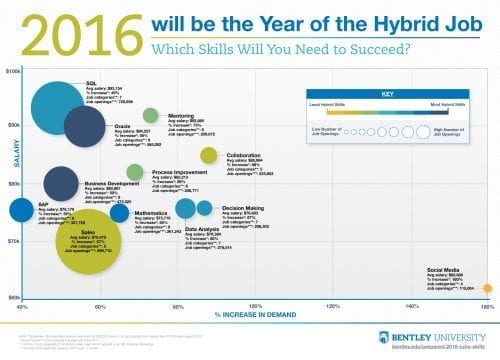Employers have raised the bar on what they expect from new employees. You’ve seen those job postings requiring everything but the kitchen sink. So how can employers get away with this? Because they can, that’s why.
Perhaps it has something to do with the increasing number of college graduates (many, not all, have learned about these in-demand skills). Or it may have something to do with the overqualified candidates who filled lower-level jobs after the recession. As long as companies can find candidates with the mix of skills they are looking for, you’ll continue to see these demanding job requirements.
This is the standout stat for this post:
71% of in-demand skills are required across two or more job categories [click to tweet]
according to analysis by Bentley University and labor market analytics firm Burning Glass, which identified skills with the highest demand.
Employees need to develop cross-functional skills and “must demonstrate deeper and broader competencies to be marketable” said Susan Brennan, associate vice president of university career services at Bentley University, in an interview with Fast Company.
The skills companies are requesting today were once isolated to a specific department or role. For example, not long ago, social media skills were only required by employees working in marketing. But now we see social media skills required in many other roles within organizations, like human resources.
So what are the skills you want to focus on? (Be prepared to re-evaluate this annually)
3 In-Demand Skills You’ll Want To Emphasize (or develop)
Check out the interactive infographic by Bentley University here.
Business Development Skills
So what are business development skills exactly? Bentley University listed list these as the most important business development skills:
- strategy
- sales
- relationship-building
Honestly, these are skills every employee needs.
Every employee has internal customers, so learning how to improve how you work together and communicate will benefit you and your career. Pitching your idea to a team is all about sales and relationship building. You can’t just shove your idea down the team members’ throats and expect them to buy into it. There’s an old acronym WIIFM, which stands for “what’s in it for me.” It’s based on the idea that people need to know how they’ll benefit before they are ready to support a new plan or idea.
If you haven’t read Daniel Pink’s “To Sell Is Human: The Surprising Truth About Moving Others” (affiliate link) pick up a copy now and learn why sales skills are necessary for every career in any industry. Pink walks the reader through why and how sales skills are so predominant in today’s workplace. In short, everyone is selling something. I wrote about it here.
Making Sense Out Of Big Data
Do you know how to compile, analyze and apply pieces of data into meaningful summaries or strategies? Pulling together data and drawing conclusions, also referred to as data analytics, is a responsibility found across departments. It doesn’t matter if you are in the accounting, human resources or marketing department. You are going to have to learn how to interpret the meaning behind all that data.
Once you’ve analyzed the data, you must learn how to communicate the findings to other departments or show how the data fits with shared business goals. Writing and orally communicating this information requires business writing skills, which are much more concise than academic writing.
You will need to understand how to extract information from the software that collects the data, like enterprise resource planning software, called ERP software. This software is an integrated system used to organize and maintain the data necessary for operations across an organization. You will also benefit from learning the most current version of analytical software to help analyze the data. Software changes frequently and organizations use different tools, so it is up to you to stay current with the newest and most popular systems.
Not-So-Soft Skills
Companies seek candidates who can demonstrate success collaborating, decision-making and mentoring, according to Bentley University’s study. As you participate in internships and hold entry-level roles, look for opportunities to grow these soft skills.
Collaborating is a no-brainer. You’ve been doing that throughout school. But a key measurement is how your teammates or collaborators would describe working with you. Are you overly dominant or an absent contributor? Are you a first choice or regularly chosen last for team projects? Successful collaboration means more than getting the project done. People have to enjoy working with you.
Decision-making skills have to do with how you evaluate choices. Instincts alone are not enough to constitute valid decisions. Have you used a methodology or system to walk through a complex decision? Are your decisions ethical? Who have you brought in to help you formulate the best decisions possible? Early in your career, tapping into other experts for advice or recommendations would show maturity and add credibility to your decision.
Anyone can mentor. It doesn’t have to be in your stated job duty for you to help others learn. New hires can mentor other new hires. Reverse mentoring between a junior and senior employee is also a thing today. Mentoring requires self-awareness, openness to feedback and learning new things. It also requires initiative, and someone who mentors may be perceived as a natural leader.
It’s important to remember that professional development and skill development are your responsibility. Staying on top of trends and knowing what skills and technology other companies use will help you stay in demand. Developing any of these skills will take more than reading a book or taking a single class online. Practice what you’ve learned and continue to build on what you know in order to stay relevant and in demand in tomorrow’s marketplace.
This post originally appeared on US News & World Report On Careers

Hannah Morgan speaks and writes about job search and career strategies. She founded CareerSherpa.net to educate professionals on how to maneuver through today’s job search process. Hannah was nominated as a LinkedIn Top Voice in Job Search and Careers and is a regular contributor to US News & World Report. She has been quoted by media outlets, including Forbes, USA Today, Money Magazine, Huffington Post, as well as many other publications. She is also author of The Infographic Resume and co-author of Social Networking for Business Success.


